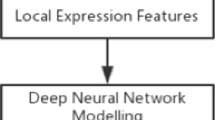Abstract
A lot of researches on classifiers, which can perform well with a given set of feature vectors, have been done. However, researches on feature vectors, which extract better feature vectors automatically, have not been done very much. We face two problems when we consider feature extraction process. One is how we can make a good feature extractor, and the other is what more separable features are. In this paper, we solved these two problems by proposing feature extractor-training methodology that uses new cluster validity as an objective function. By combining feature extractor to Fuzzy Neural Network Model, we achieve on-line adaptation capability as well as optimized feature extraction. The result shows recognition rate of 97% when on-line adaptation is being done.
Preview
Unable to display preview. Download preview PDF.
Similar content being viewed by others
References
Park, G.-T.: A Study on Extraction of Emotion from Facial Image using Soft Computing Techniques. Ph.D Thesis, Dept. of Electrical Engineering and Computer Science, KAIST (1998)
Kapoor, A., Yuan, Q., Picard, R.W.: Fully Automatic Upper Facial Action Recognition. IEEE International Analysis and Modeling of Faces and Gestures, 195–202 (2003)
Fasel, B.: Robust Facial Analysis using Convolutional Neural Networks. In: Proc. of the ICPR (2002)
Guodong, G., Charles, R.D.: Simultaneuous Feature Selection and Classifier Training via Linear Programming: A Case Study for Face Expression Recognition. In: Proc. Of IEEE CVPR (2003)
Cohen, I., et al.: Facial Expression Recognition From Video Sequences. In: ICME (2002)
Bezdek, J.C.: Numerical taxonomy with fuzzy sets. J. Math. Biol. 1, 57–71 (1974)
Xuanli, L., Beni, G.: A Validity Measure for Fuzzy Clustering. IEEE Trans. on PAMI 13 (1991)
Kim, D.-W., Lee, K.H., Lee, D.H.: Fuzzy Cluster Validation Index based on Inter-Cluster Proximity. Pattern Recognition Letters (2003)
Kim, Y.S., Ham, C.H., Baek, Y.S.: A Fuzzy Neural Network Model Solving the Underutilization Problem. Journal of Korea Fuzzy Logic and Intelligent Systems Society 11, 354–358 (2001)
Lee, S.W., Kim, D.-J., Kim, Y.S., Bien, Z.: An Adaptive Facial Expression Recognition System Using Fuzzy Neural Network Model and Q-learning. In: SCISISIS, Yokohama. Japan (2004)
Ranganathan, A.: The LM Algorithm, Report of BORG Lab. in Georgia Institute of Technology (2004)
Edwin, K.P., Zak, S.H.: An Introduction to Optimization. John Wiley & Sons, Chichester (2001)
Author information
Authors and Affiliations
Editor information
Editors and Affiliations
Rights and permissions
Copyright information
© 2005 Springer-Verlag Berlin Heidelberg
About this paper
Cite this paper
Lee, S.W., Kim, DJ., Kim, Y.S., Bien, Z. (2005). Training of Feature Extractor via New Cluster Validity – Application to Adaptive Facial Expression Recognition. In: Khosla, R., Howlett, R.J., Jain, L.C. (eds) Knowledge-Based Intelligent Information and Engineering Systems. KES 2005. Lecture Notes in Computer Science(), vol 3684. Springer, Berlin, Heidelberg. https://doi.org/10.1007/11554028_75
Download citation
DOI: https://doi.org/10.1007/11554028_75
Publisher Name: Springer, Berlin, Heidelberg
Print ISBN: 978-3-540-28897-8
Online ISBN: 978-3-540-31997-9
eBook Packages: Computer ScienceComputer Science (R0)




